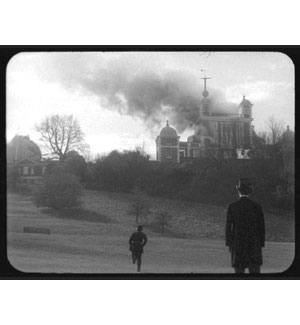Greenwich Degree Zero
dal 21/2/2006 al 1/4/2006
Segnalato da
21/2/2006
Greenwich Degree Zero
Beaconsfield, London
The first collaboration between artist Rod Dickinson and artist/novelist Tom McCarthy. On February 15th, 1894, a French anarchist named Martial Bourdin was killed when the bomb he was carrying detonated. The exhibition interrogates the role of media and technology in the construction of public experience and memory. Using the mechanisms of historical representation, the show is a compelling mixture of fact and fiction.

Rod Dickinson and Tom McCarthy
Greenwich Degree Zero, the first collaboration between artist Rod Dickinson
and artist/novelist Tom McCarthy, is an exhibition that interrogates the
role of media and technology in the construction of public experience and
memory. Using the mechanisms of historical representation, Greenwich Degree
Zero is a compelling mixture of fact and fiction.
The artists' starting point is a strange event that, while it received large
amounts of publicity at the time, is now all but forgotten. On the afternoon
of February 15th, 1894, a French anarchist named Martial Bourdin was killed
when the bomb he was carrying detonated outside the Royal Observatory in
London's Greenwich Park. It was generally assumed that his intention had
been to blow up this building, the place from which all time throughout the
British Empire and the world was measured, and a prime symbol of science -
"the sacrosanct fetish of the day''1.
In Greenwich Degree Zero, Rod Dickinson and Tom McCarthy re-imagine
Bourdin's act as a successful attack on the Observatory. They do so by
infiltrating and twisting the media of Bourdin's time: creating a film shot
on a hand-cranked Victorian cinematic camera depicting the burning
Observatory, and reprinting existing 1894 newspaper reports and anarchist
literature 'doctored' to fit their version of events. The resulting
pseudo-archival installation reports an event that did not quite happen,
relocating the genuine public outrage and hysteria about the threat of
anarchist terror that prevailed in the 1890s in the ambiguous space of
non-event.
Victorian anarchism was linked with the avant-garde in art and literature of
the late 19th century and was also a popular mass movement. Bourdin's death
brought on a plethora of speculative stories in both the mainstream and
underground media. A conspiracy theory developed that a well-timed Œforeign
anarchist outrage¹ would propel Lord Salisbury's proposals for tightening
the asylum laws through parliament. Rather than try to establish the
'truth', Dickinson and McCarthy use a form of repetition to reach back to
degree zero: of time, of mediation and of terror.
Financially assisted by Arts Council England.
Preview: Tuesday 21 February from 6pm
Beaconsfield
22 Newport Street - London
Gallery hours: Wednesday-Sunday 12-6pm



